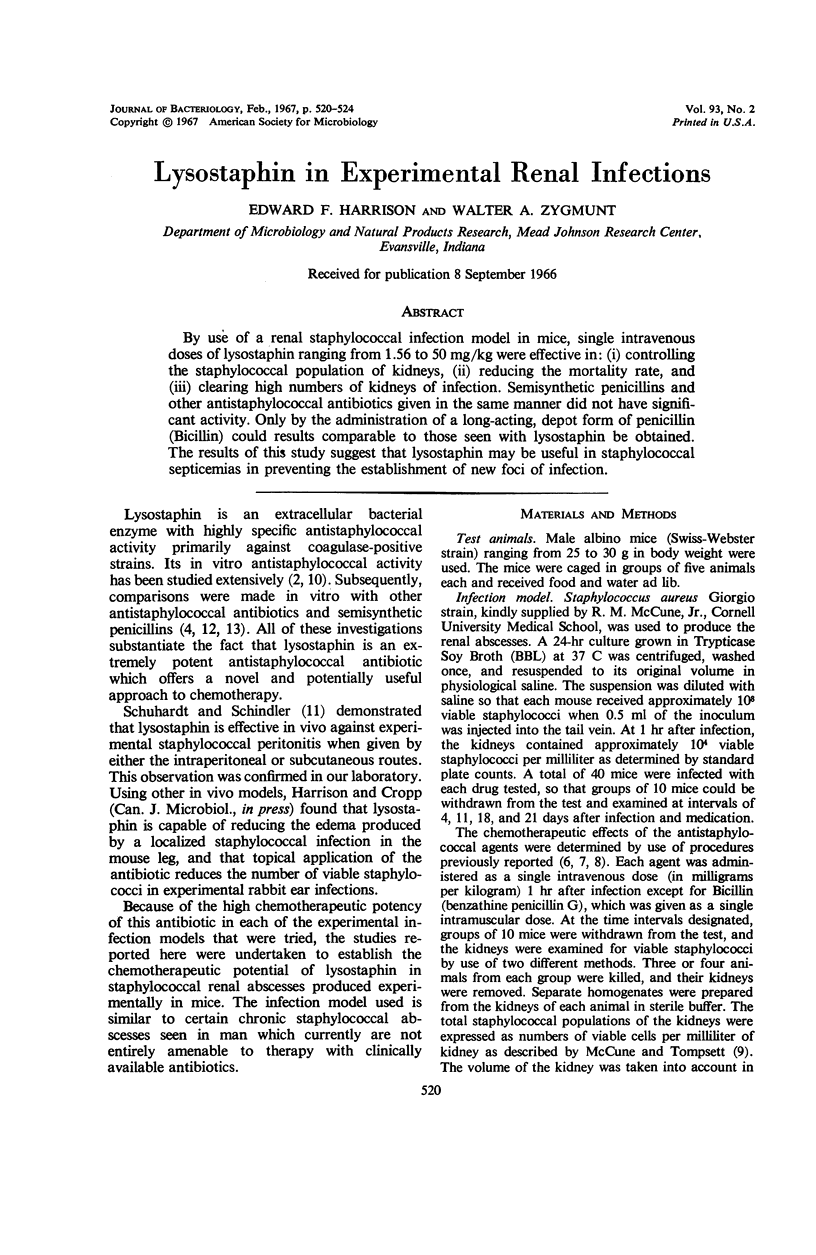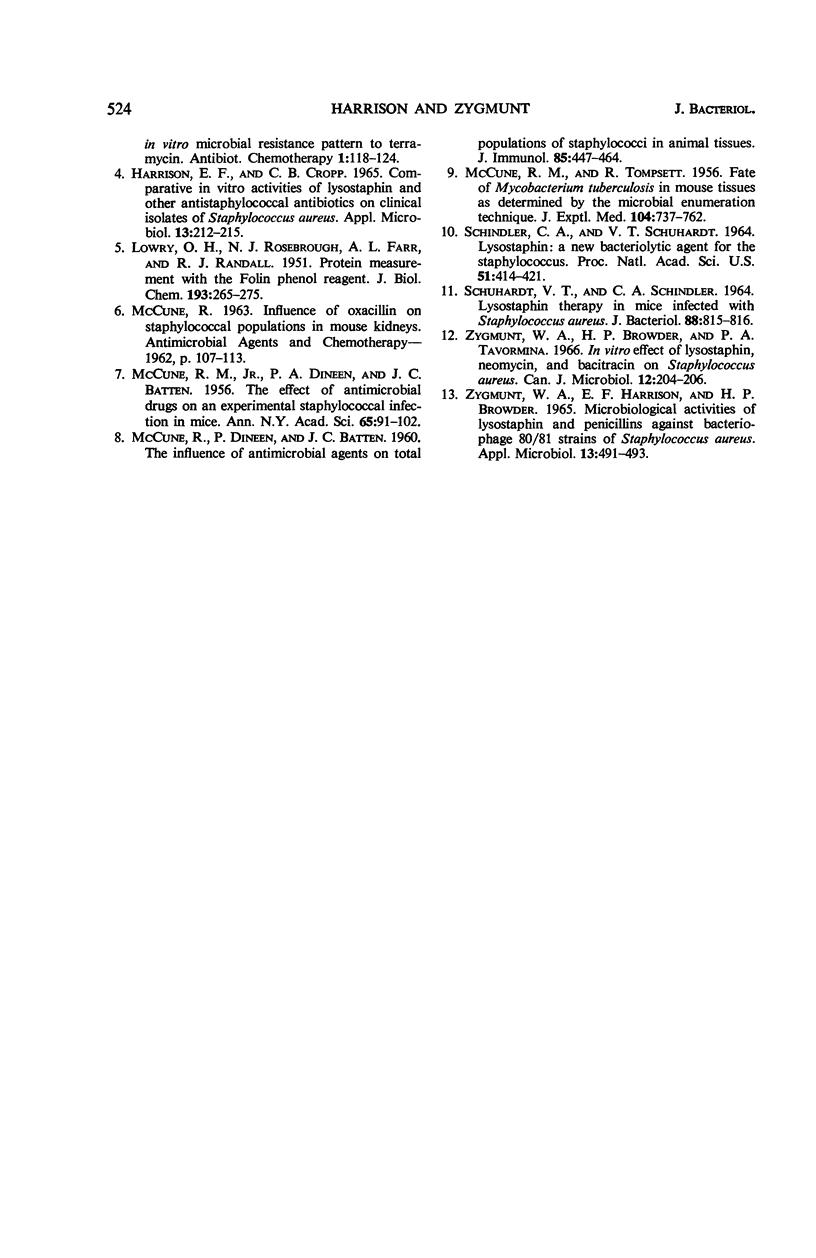Abstract
By use of a renal staphylococcal infection model in mice, single intravenous doses of lysostaphin ranging from 1.56 to 50 mg/kg were effective in: (i) controlling the staphylococcal population of kidneys, (ii) reducing the mortality rate, and (iii) clearing high numbers of kidneys of infection. Semisynthetic penicillins and other antistaphylococcal antibiotics given in the same manner did not have significant activity. Only by the administration of a long-acting, depot form of penicillin (Bicillin) could results comparable to those seen with lysostaphin be obtained. The results of this study suggest that lysostaphin may be useful in staphylococcal septicemias in preventing the establishment of new foci of infection.
Full text
PDF




Selected References
These references are in PubMed. This may not be the complete list of references from this article.
- BATTEN J. C., DINEEN P. A. P., MCCUNE R. M., Jr The effect of antimicrobial drugs on an experimental staphylococcal infection in mice. Ann N Y Acad Sci. 1956 Aug 31;65(3):91–102. doi: 10.1111/j.1749-6632.1956.tb36627.x. [DOI] [PubMed] [Google Scholar]
- BROWDER H. P., ZYGMUNT W. A., YOUNG J. R., TAVORMINA P. A. LYSOSTAPHIN: ENZYMATIC MODE OF ACTION. Biochem Biophys Res Commun. 1965 Apr 23;19:383–389. doi: 10.1016/0006-291x(65)90473-0. [DOI] [PubMed] [Google Scholar]
- CROPP C. B., HARRISON E. F. THE IN VITRO EFFECT OF LYSOSTAPHIN ON CLINICAL ISOLATES OF STAPHYLOCOCCUS AUREUS. Can J Microbiol. 1964 Dec;10:823–828. doi: 10.1139/m64-107. [DOI] [PubMed] [Google Scholar]
- HARRISON E. F., CROPP C. B. COMPARATIVE IN VITRO ACTIVITIES OF LYSOSTAPHIN AND OTHER ANTISTAPHYLOCOCCAL ANTIBIOTICS ON CLINICAL ISOLATES OF STAPHYLOCOCCUS AUREUS. Appl Microbiol. 1965 Mar;13:212–215. doi: 10.1128/am.13.2.212-215.1965. [DOI] [PMC free article] [PubMed] [Google Scholar]
- LOWRY O. H., ROSEBROUGH N. J., FARR A. L., RANDALL R. J. Protein measurement with the Folin phenol reagent. J Biol Chem. 1951 Nov;193(1):265–275. [PubMed] [Google Scholar]
- MCCUNE R. M., Jr, TOMPSETT R. Fate of Mycobacterium tuberculosis in mouse tissues as determined by the microbial enumeration technique. I. The persistence of drug-susceptible tubercle bacilli in the tissues despite prolonged antimicrobial therapy. J Exp Med. 1956 Nov 1;104(5):737–762. doi: 10.1084/jem.104.5.737. [DOI] [PMC free article] [PubMed] [Google Scholar]
- MCCUNE R., DINEEN P., BATTEN J. C. The influence of antimicrobial agents on total populations of Staphylococci in animal tissues. J Immunol. 1960 Nov;85:447–464. [PubMed] [Google Scholar]
- SCHINDLER C. A., SCHUHARDT V. T. LYSOSTAPHIN: A NEW BACTERIOLYTIC AGENT FOR THE STAPHYLOCOCCUS. Proc Natl Acad Sci U S A. 1964 Mar;51:414–421. doi: 10.1073/pnas.51.3.414. [DOI] [PMC free article] [PubMed] [Google Scholar]
- SCHUHARDT V. T., SCHINDLER C. A. LYSOSTAPHIN THERAPY IN MICE INFECTED WITH STAPHYLOCOCCUS AUREUS. J Bacteriol. 1964 Sep;88:815–816. doi: 10.1128/jb.88.3.815-816.1964. [DOI] [PMC free article] [PubMed] [Google Scholar]
- ZYGMUNT W. A., HARRISON E. F., BROWDER H. P. MICROBIOLOGICAL ACTIVITIES OF LYSOSTAPHIN AND PENICILLINS AGAINST BACTERIOPHAGE 80/81 STRAINS OF STAPHYLOCOCCUS AUREUS. Appl Microbiol. 1965 May;13:491–493. doi: 10.1128/am.13.3.491-493.1965. [DOI] [PMC free article] [PubMed] [Google Scholar]
- Zygmunt W. A., Browder H. P., Tavormina P. A. In vitro effect of lysostaphin, neomycin, and bacitracin on Staphylococcus aureus. Can J Microbiol. 1966 Feb;12(1):204–206. doi: 10.1139/m66-028. [DOI] [PubMed] [Google Scholar]


